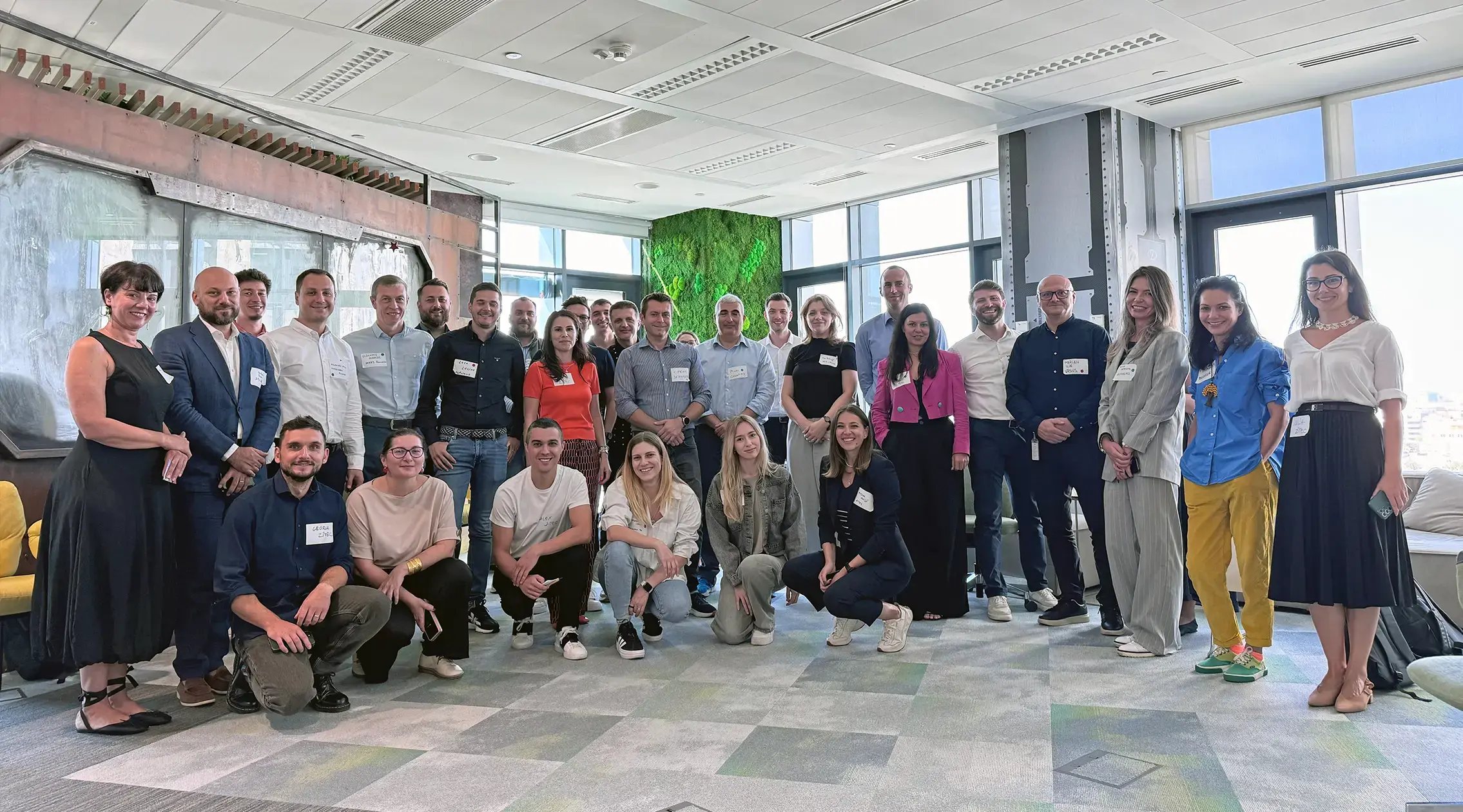Zitec, Google Cloud, and 16 other retail industry leaders convened for a closed-door event to delve into the practical implications of AI in retail and go beyond the hype to explore its true business impact.
AI, as a technology and business enabler, has already proven its impact across all departments, industries, and applications. AI in retail, specifically, has shown some of the most significant outcomes and use cases. From its impact on hyper-personalization, omnichannel, supply chain, and inventory management, to digital marketing and data management, AI is everywhere.
Hence, we convened with 16 of the most prominent Romanian industry leaders to discuss how AI is shaping retail, what challenges and opportunities this tech poses, and how to better integrate AI into business going forward.
At the heart of the discussion, we explored how AI is reshaping the retail landscape. Retailers opened up about their journeys, facing challenges like data management, upgrading legacy systems, improving hyper-personalization, and more.
So, let's dive into the top five findings uncovered during this informative conversation and tap into the real-life solutions to existing and future challenges related to AI solutions in retail.
Event Overview – Objectives, Goals, and Outcomes
The exclusive Zitec and Google Cloud event gathered retail industry leaders to assess and discuss AI's transformative potential in retail. The objective was clear: to shift focus from AI as a buzzword to its tangible business impacts through real-world AI applicability scenarios.
Two crucial aspects set this gathering apart:
- The closed-door event served as a starting point for some of the greatest minds in Romanian retail to brainstorm, share insights, and come up with practical solutions free from the usual constraints of public forums.
- Featuring insights from pioneers at Zitec and Google Cloud, the curated selection of only 16 participants ensured a diverse crowd spanning retail sectors such as FMCG, cosmetics, fashion & apparel, consumer electronics, and DIY.
More importantly, the event convened these executives under a common commitment: to find new and improved ways of adopting retail digital transformation using AI that prioritizes ethical practices while making sure technology benefits all stakeholders (partners, customers, and employees) while improving business margins.
Top Challenges of Using AI in Retail and Industry-Shaping Perspectives
Retail leaders across various industries, such as FMCG, cosmetics, fashion & apparel, consumer electronics, or DIY, are working to overcome AI's complexities – and it’s not an easy feat.
From discovering and interpreting large volumes of data to updating outdated systems such as those used in inventory management, demand forecasting, or store operations, the road to AI fluency is bumpy. However, retail leaders agreed on one clear priority: the importance of having the right business scenarios and getting the stakeholders (boards, partners, and employees) on board to navigate these challenges.
Zitec, Google Cloud, and top decision-makers such as our event speakers – AdoreMe, Leroy Merlin, or Dr. Max – uncovered the following challenges of using AI in retail:
Organizing data
Effective AI applications require organized, accessible, and high-quality data to uncover business opportunities. Yet, retail companies often deal with large amounts of unstructured, incomplete, and siloed data. This makes improving data-dependent operations such as inventory management, demand forecasting, supply chain management, and customer engagement that much harder.
The solution is to develop methods to organize this data, but the lack of procedures and processes for these activities is a major impediment. This takes us to the next two challenges identified by retail executives at the roundtable.
One thing that is often overlooked is that retailers have access to vast amounts of data that remain unused or incomplete. This data is actually a valuable resource if structured correctly. For example, data from internal systems – such as CRM, ERP, or e-commerce platforms – should be integrated into a centralized platform. Additionally, first-party data, the direct information collected from consumers, should be included. This provides a real competitive advantage but must be collected and used in compliance with GDPR regulations.
Data & AI Director, Zitec
The talent shortage
There is a significant gap in AI-specific skills in the retail industry. Finding and retaining the right talent who can bridge the gap between technical AI capabilities and strategic business applications is a growing pain. Retailers are starting to realize that specialized knowledge and experience are often found outside in-house teams.
Lack of existing procedures and systems
Many retail businesses operate on legacy systems that are not optimized for AI integration. However, developing or updating procedures to incorporate AI technology demands time and investment. Sometimes, the fastest and most cost-effective way is to seek a technological partnership that can provide cutting-edge AI expertise, strategic advice, and the implementation of complex AI solutions which in-house teams may not have the bandwidth or expertise to develop.
Cybersecurity risks
Source
More data to handle means more security risks, and with ever-evolving cybersecurity threats, this challenge remains hard to keep up with. Ensuring the protection of customer and business data against cyber risks is a major focus area in 2024 and beyond.
How Retailers Conquer AI Integration
Digging deeper, we explored the immediate opportunities of integrating AI into existing systems. We learned that organizing data and getting systems up to speed are major stumbling blocks. Plus, finding the right talent to lead the charge is key to success in the AI field.
Still, upon a fruitful conversation with the bright minds that participated in this exclusive roundtable event, some insights emerged:
- In adopting new technologies, the right solutions should encompass diverse scenarios rather than solely relying on off-the-shelf applications. While big retailers prefer bespoke solutions from partners like Zitec over off-the-shelf for digital transformation, with AI, things are more complicated than that. Current business models require a "tailored-everything" approach, starting with their current state of technology, to custom AI solution development using specialized models like predictive analytics, machine learning, Gen AI, etc.
- Pre-trained models like RecommendationsAI, semi-custom options with market testing, and fully custom models should all be leveraged to deliver optimal business outcomes based on a thorough audit of current legacy systems, in-house tech expertise, organizational readiness, ERP and customer data, and more. That's why our experts advise clients to opt for a co-financed PoC with Zitec and Google Cloud to test and iterate AI solutions before full-scale implementation.

- The knowledge and experience of seasoned experts are a sure way to tackle the complexities of AI. That’s why competitive organizations often choose to partner with ready-to-operate teams to get strategic insights and custom-made AI integrations rather than operating in-house at potentially larger costs.
Zitec, Google, and Top Retail Decision-Makers Discussed 5 Business Opportunities for AI in Retail
Venturing into the world of AI is a new and complex feat, which is why retail speakers at the event stressed the need for a solid data foundation and a culture that embraces innovation. Eventually, they uncovered five main findings around AI for retail:
1. AI in data management
During the exclusive roundtable, the focus fell on data management with AI, as participants discussed how retailers handle and use vast datasets in their business to improve areas such as inventory management, supply chain optimization, and personalization based on customer preferences and past purchase behaviors.
"When starting any project, especially those involving AI and data analytics, it’s essential to first define your business goals. Whether the goal is to improve customer experience, boost sales, or optimize operations, having a clear objective sets the direction for the entire project. Data is key to aligning actions with these goals. By analyzing relevant data, businesses can better understand their current operations, identify areas for improvement, and make more informed decisions. It also provides valuable insights into customer behavior, helping businesses tailor their strategies to meet customer needs and expectations."
Data Analytics & AI Services Director at Zitec
Retailers discussed the necessity of solid data systems such as data warehouses and data lakes capable of handling both structured and unstructured data to improve decision-making and contribute to more personalized customer experiences and a better overview of their ERP systems.
- One such example is Google's pre-built product, RecommendationsAI (offering personalized product recommendations). With access to extensive volumes of data from retail customers that continuously enrich the AI algorithms, it has been extensively developed to deliver outcomes such as engagement, revenue, or conversions.
- Another business application that stood out was the use of AI for inventory management and predictive analytics across all functions of logistics, from optimizing delivery routes, to store shelves management, or even pricing strategies. In fact, we've already seen how a participant improved supply chain efficiency by analyzing historical sales data and market trends using artificial intelligence to better predict stock levels, reduce overstock and stockouts, and improve customer product availability.
However, when looking at the future of retail, there’s growing concern about the compatibility of new artificial intelligence technologies with old databases and applications. The need for efficient data governance is also a great hurdle to overcome.
2. AI for hyper-personalization
The implementation of machine learning models, like Google's Recommendations AI, allows you to analyze valuable customer data and predict buying behaviors with high accuracy during the online shopping experience. This leads us to our next point discussed: hyper-personalization and improving the customer experience.
Elevating customer experience stands as the leading advantage from integrating AI into retail operations. As a Google Cloud Premier Partner, we help retailers leverage the full potential of Google's solutions, like Google Search, RecommendationsAI, or GenAI via Vertex AI.
Chief Technology Officer, Zitec
- During the roundtable, one fashion retailer revealed that by integrating AI-driven personalization tools, they could offer outfit recommendations based on customer's past purchase patterns and browsing behaviors. This boosted customer satisfaction and increased repeat purchases, as well as average order values for their brand.
- Another tangible example of AI's impact in retail is through personalized marketing campaigns. For instance, a retailer can implement machine learning algorithms to analyze customer purchase history and browsing behavior. This data can be used to craft personalized email marketing campaigns recommending products that align with past purchases.
- Dynamic personalization is also a hot topic among retailers, who are starting to understand the power of analyzing live user behavior to manage promotions and recommend products or targeted promotions, perform upsell actions with dynamic merchandising offers, and help users navigate through products or services with tailored recommendations.
- Additionally, the use of NLP and machine learning algorithms to understand customer intent can provide actionable insights to improve customer service and optimize store operations. When focusing on real-time insights and accurate forecasts, AI tools can improve customer interactions and drive higher-value activities, such as addressing lost sales or fine-tuning pricing strategies to better match customer expectations.
But AI and personalization is a much more complex topic than that. Moreover, ensuring that personalization algorithms remain transparent and ethical is crucial to maintaining customer trust and adhering to regulations such as GDPR.
3. Pragmatic AI adoption in retail

The first step in AI adoption is identifying the business scenarios that would benefit most from AI intervention (e.g., improving customer experiences to grow customer retention, loss prevention by reducing cart abandonment or addressing low cart values to improve efficiency of sales).
For instance, in a Zitec study conducted on over 150 CIOs in retail, we uncovered that 57% of these leaders will use AI to improve the checkout process. Many also see the value in using AI for fraud detection (53%), demand forecasting (51%) and chatbots that interact with their customers (49%).
What’s more interesting is that these market findings align with what our retail participants have in plans for their organizations. As AI strategies are still being defined, every organization has the opportunity to develop unique use cases and secure a competitive advantage.
Remember to begin with a proof-of-concept that can potentially turn into a scalable project, demonstrating quick wins and tangible benefits.
Another aspect we discussed was the alignment of AI technology with the existing digital infrastructure. Here, the role of digital transformation partners becomes invaluable – which takes us to our next topic.
4. Digital transformation in retail, with AI
The conversation extended beyond general digital transformation to focus specifically on integrating AI to reshape retail operations.
But the integration of AI affects various stakeholders within the retail ecosystem:
- Partners must engage with more sophisticated data-sharing and analytics platforms.
- Customers benefit from more personalized experiences but also require assurances regarding the security of their data.
- Employees face shifts in their roles and responsibilities.
Our advice? Tackle digital transformation strategically. Start with small projects that delight customers. Focus on key areas to gain distinctive advantages:
- Loyalty programs to build lasting relationships
- Search functionality to simplify product finding
- Data-driven recommendations to improve product discovery
- AI-powered conversational commerce to provide personalized support
Central to digital transformation with AI is cloud technology. Google Cloud solutions offer efficient, flexible, and scalable infrastructure that help retailers thrive long-term.
With the adoption of AI in retail, new roles such as AI specialists, data scientists, and user experience designers become crucial. However, the talent shortage crisis is a problem that directly affects the pace of AI adoption.
5. Drive perpetual experimentation
In the face of evolving consumer behaviors and technological advancements, perpetual innovation is necessary.
A key strategy is to create environments where testing new ideas becomes part of the business DNA. One of the participants already established a structure for innovation through innovation labs that encourage team members to experiment with GenAI applications. As long as teams feel empowered to experiment with emerging technologies like Generative AI (GenAI), machine learning, or new digital tools without fear of failure, the organization is already one step ahead of competitors stuck in legacy mindsets and systems.
AI is the Next Big Thing in Retail – But What’s Next?
The journey into AI and digital transformation is just beginning. With each innovation and partnership, retailers are discovering new ways and AI use cases to improve customer experiences and operations.
We know – the world of retail AI is moving fast, and you want to keep up with it. The good news is that staying engaged with new issues and participating in these discussions will give you a front-row seat to the latest innovations shaping the market.
Final takeaways: what can you do today?

- Strategic partnerships are essential for maximizing AI's potential in retail and overcoming the talent shortage.
- Start small with AI projects that can scale. Identify a specific area within your retail operations where AI can have immediate benefits, pilot a project to test and refine your approach via a proof of concept (POC) approach, and asses the anticipated ROI, feasibility, and usability of the project.
- Ensure your data is clean, organized, and accessible. Effective data management is critical for successful AI implementation. Is data structuring, finding effective AI retail applications, or modernizing legacy systems a challenge? Reach out.





.webp)